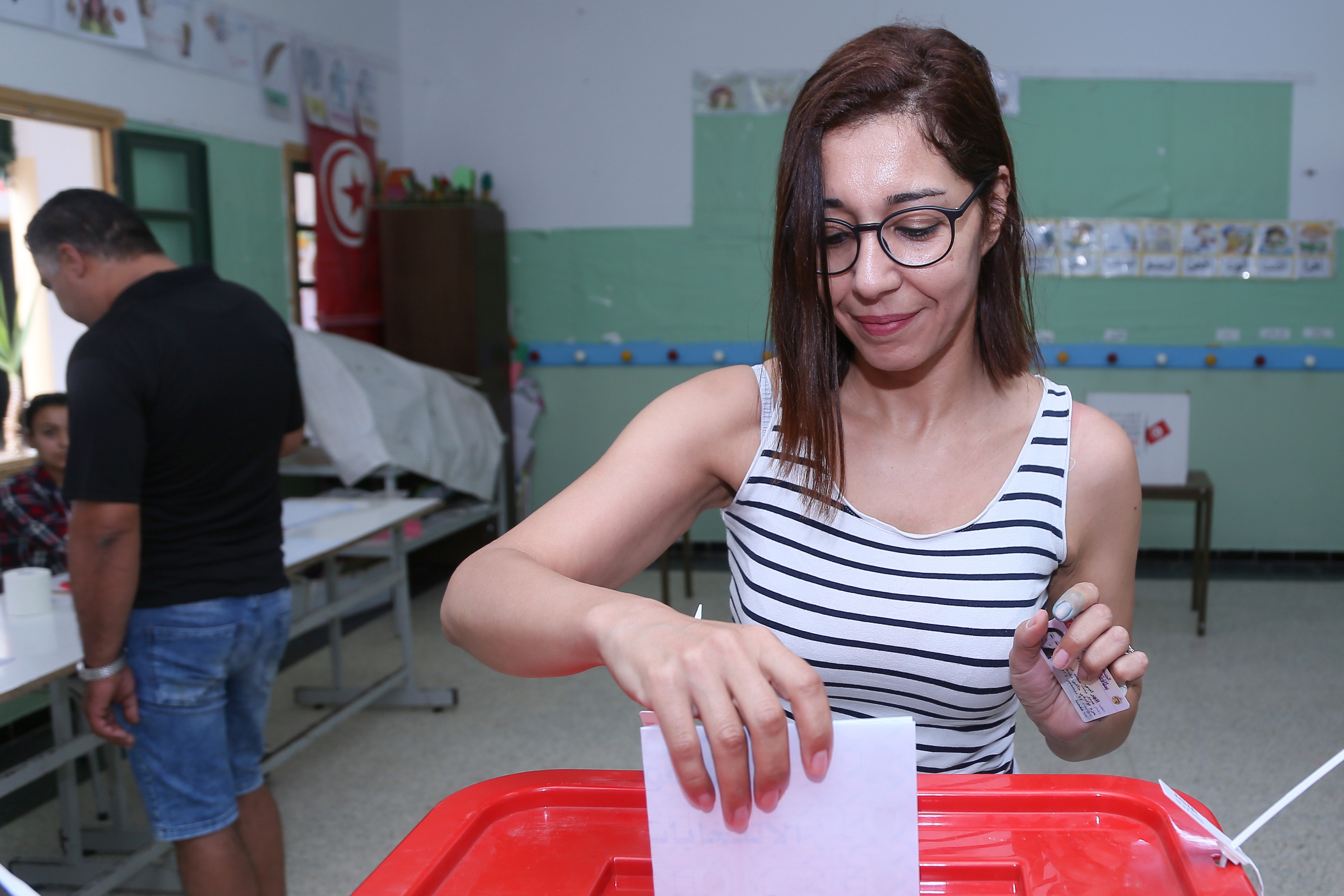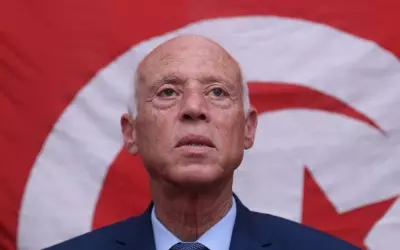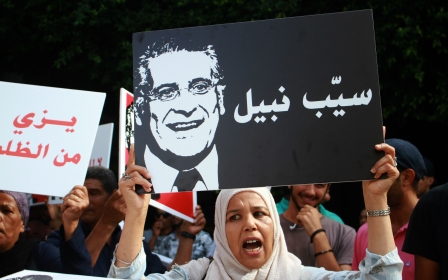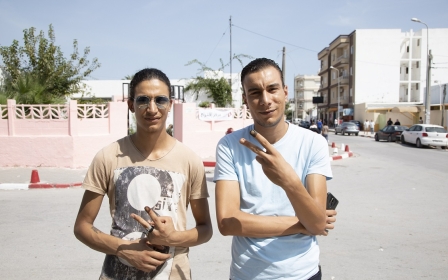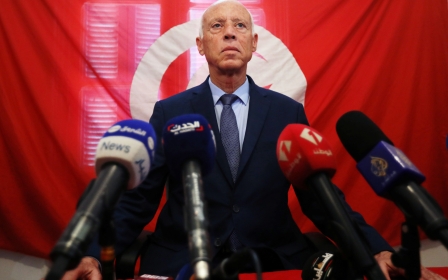To save Tunisia’s democracy, both candidates must be heard equally
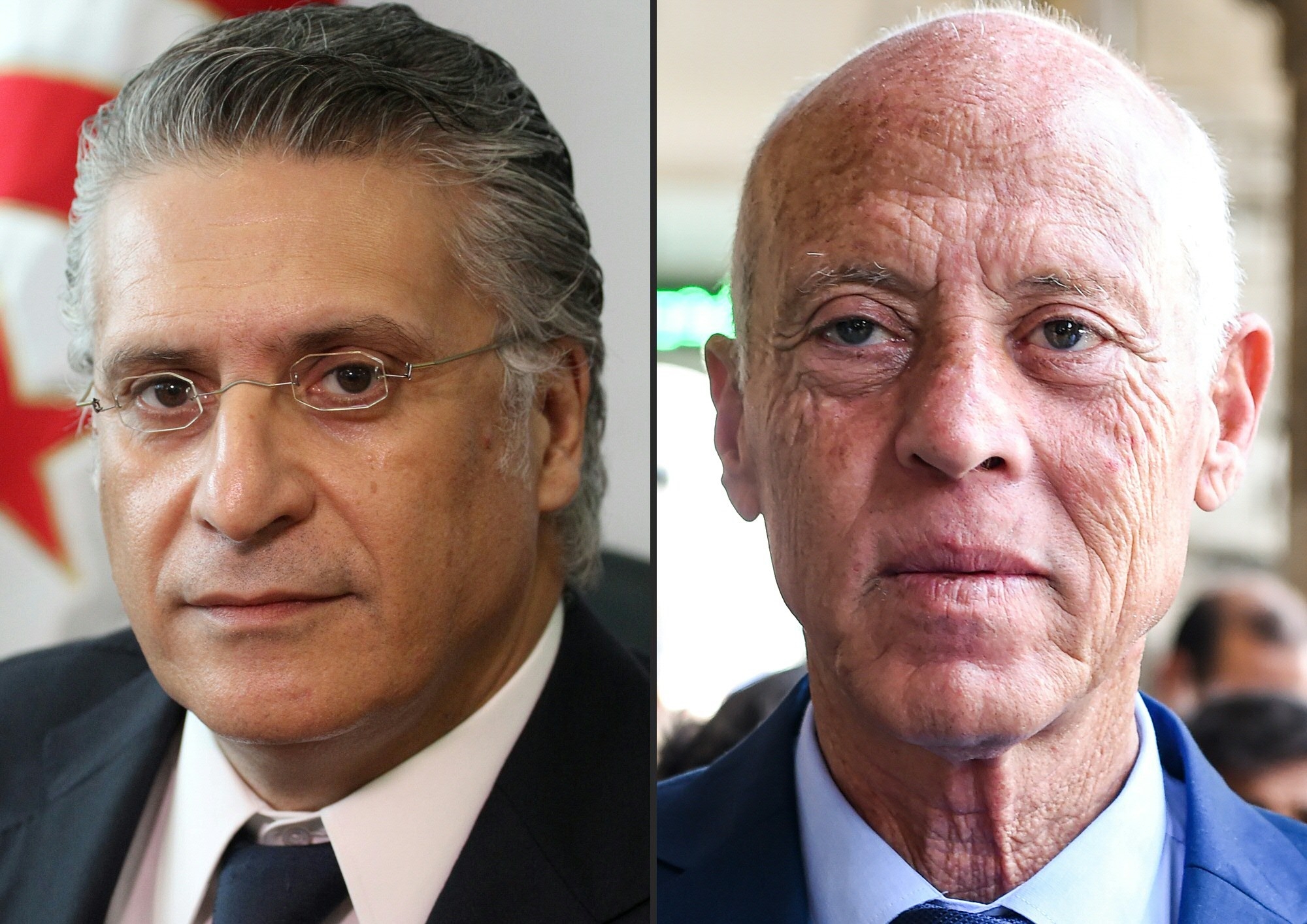
An old saying here goes "the impossible is not Tunisian”. Yet Tunisia may well be headed for an impossible situation just days before its crucial presidential run-off elections onSunday. It will be the most serious test this young democracy has faced since its 2011 revolution that sparked the first wave of the Arab Spring.
Election legitimacy
Two names will be on the ballot when Tunisian voters head to the polls: Kais Saied, a law professor, and Nabil Karoui, a businessman, who emerged as the two winners of the first presidential vote on 15 September.
But Karoui is in pre-trial detention on charges of tax fraud and money laundering, campaigning from his prison cell since his arrest on 23 August. His continued absence from the campaign trail - and, crucially, from Tunisia’s historical presidential debates - is threatening the legitimacy of the elections.
Karoui's absence from the campaign trail is threatening the legitimacy of the elections
Should he remain in detention, Karoui has announced that he will contest the results based on his absence from the debates, which he claims cost him an equal opportunity to address voters and 10 percent of the first-round vote.
New MEE newsletter: Jerusalem Dispatch
Sign up to get the latest insights and analysis on Israel-Palestine, alongside Turkey Unpacked and other MEE newsletters
While this number cannot be verified, his case may well succeed. A growing chorus of stakeholders, including the election authority, national media organisations, international observer missions and even Tunisia’s interim president, have warned that the results will be viewed as lacking credibility and may even be invalidated.
A narrow path to avoid this deadlock remains. We must act fast.
More at stake than principle
Whether or not the charges - which are very serious - have merit, Karoui has been ruled by authorities as eligible to run, and therefore deserves an equal chance. Our coalition of presidential debate organisers is advocating for both candidates to be allowed to participate in run-off debates this Wednesday and Thursday to make their case to voters.
To see Tunisia falter would dampen the hopes and aspirations of Arabs and citizens worldwide
There is more at stake than simply principle. An asterisk to the Arab world’s only free and fair presidential elections would be a blow to democracy worldwide. At least 3.5 million Tunisian voters watched September’s first televised debate; thousands more listened on radios.
In a country of seven million registered voters, this represents over half the electorate - surpassing even the audience share for the 2017 contentious French presidential run-off debate between Emmanual Macron and Marine Le Pen.
Beacon of democracy
Given Article 52 of Tunisia’s electoral law, which guarantees “equal opportunities” for candidates, there may be strong grounds for Tunisia’s presidential elections to be contested and even overturned in court, a development that would be a stain Tunisia’s democratic success story.
Tunisia’s other candidate, Kais Saied, has suspended his own campaign in a protest about Karoui’s inability to campaign or debate with him, citing the law.
Tunisia stands not only as the lone beacon of democracy in the Arab world, but as a standard-bearer for emerging democracies elsewhere. To see Tunisia falter would dampen the hopes and aspirations of Arabs and citizens worldwide. In order to save Tunisia’s democracy, it is imperative to allow both candidates a mutual forum to address Tunisian voters on a strictly equal footing as fast as possible - and we have a plan for that.
Equal opportunity
A decision to release Karoui from prison, temporarily or otherwise, to take part in live, in-studio debates rests solely with the Tunisian judiciary. It remains the best hope to ensure the principle of equal opportunity.
This, together with rival candidate Saied’s decision to suspend his campaign, creates a more even playing field and greatly increases the chances of the elections holding up to legal scrutiny. Tunisia’s predicament is not without precedent.
A decision to release Karoui from prison to take part in live, in-studio debates remains the best hope to ensure the principle of equal opportunity
Gregorio Santos ran for president in Peru’s 2016 elections, spending the campaign period in preventative custody on corruption charges. In February 2016, he participated in a presidential debate by telephone; later he secured a legal injunction for a 10-hour release to take part in a further debate in April.
The Munathara Initiative and Tunisia’s state-owned Tunisia Television are pushing ahead to hold two presidential run-off debates featuring both candidates this week, on Wednesday and Thursday, at a television studio in the Tunisian capital.
But should the courts object to in-studio debates, we have proposed several innovative alternatives to ensure both candidates a forum to present and defend their views.
Alternative solutions
One solution is to have both candidates take part in a debate via audio link - the same audio link - with their images displayed on a television screen. This would prevent one candidate from having the upper hand by physically appearing on screen while the other, in jail, cannot.
Should the courts refuse a live-feed from prison, another solution is to have pre-recorded answers to standardised questions, juxtaposed in a live television programme. Surrogates for each candidate could be present to expand on or defend their answers.
While this model would miss a critical element of direct interaction between the candidates, it would allow citizens to compare their positions - a central element in any election debate. Such a model, albeit for different reasons, was successfully used in Uganda in 2015.
If neither video nor audio feeds are permitted by the court, Munathara and its partners are proposing that written rebuttals be obtained through multiple visits to the candidates. Should the courts block even this form of communication, as a very last resort, the written answers could be combined with comments by surrogates on stage.
Saving the elections
At this point in Tunisia, any of these options would help fill the glaring void in the public sphere just days before a critical vote tied so closely to the fate of the country’s democratic project. It is not too late to save Tunisia’s presidential elections. But with the election days away, time is running out.
This morning, along with Tunisian syndicates representing eight television networks and 13 radio stations, we filed a legal petition to the investigating judge at Tunisia’s Financial and Economic Judiciary Pole, laying out detailed options to hold the debates in person, via audio or in writing, and urging the court to allow Karoui to take part.
Tunisia’s presidential run-off elections will be held on 13 October. As of midnight this Friday, candidates must stop campaigning and refrain from issuing statements as part of a media silence.
But one candidate’s ongoing silence is already deafening the electoral debate. For those who care about democracy around and the world, it is in our interests to let both Tunisian candidates be heard equally.
Our path may be narrow, but is not impossible.
The views expressed in this article belong to the author and do not necessarily reflect the editorial policy of Middle East Eye.
Middle East Eye delivers independent and unrivalled coverage and analysis of the Middle East, North Africa and beyond. To learn more about republishing this content and the associated fees, please fill out this form. More about MEE can be found here.



